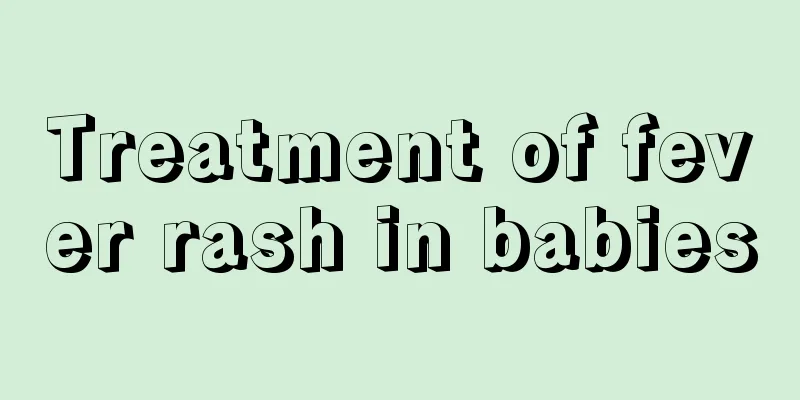What should I do if my baby has rotten teeth?

|
Some children will start to grow teeth when they are seven or eight months old, and some will also grow teeth after one year old. With the improvement of living conditions, most children are in an excellent living environment. Parents try their best to provide a good living environment for their babies, and they eat a lot of snacks, which is the reason for the baby's rotten teeth. In fact, the key to baby tooth decay is prevention, not just waiting until problems occur before thinking about what to do. So what should we do if our baby has rotten teeth? 1. Experts believe that the baby's oral cavity should be cleaned before the baby's teeth come out. This is the starting point for the baby to develop good living habits and maintain dental health in the future. The correct way to do it is that every time after the baby finishes drinking milk or juice, the mother should wrap sterilized wet gauze on her fingers, or use a cotton swab dipped in clean water to wipe the baby's oral mucosa, gums and tongue. 2. When the baby's teeth erupt, parents can use safe teething rings, toys that help teething, teething foods, etc. to reduce the baby's discomfort. In addition, you can also give your baby a facial massage when he is teething to relax his facial muscles, which can also achieve better results. 3. Try to breastfeed. The baby's vigorous sucking of breast milk is beneficial to the normal development of the maxillofacial region. If artificial pacifiers are used improperly during artificial feeding, it can easily cause facial and dental abnormalities. When artificial feeding is necessary, you should choose a pacifier that imitates the nipple design. At the same time, train your baby to use cups and bowls to eat as early as possible to avoid becoming dependent on bottles. 4. Breast milk is the best food for babies. Foreign pediatric experts pointed out that although breast milk is sweet, deciduous teeth will not be decayed if they are immersed in breast milk for a long time. Breast milk can also inhibit the growth of bacteria on teeth and prevent tooth decay. Breast milk also contains calcium needed for the baby's growth and development, which is why breastfed babies do not suffer from premature tooth decay. 5. Do not give your baby food or drinks before going to bed. Some mothers like to put a bottle of milk or juice in the baby's mouth and wait for him to fall asleep. Because milk and juice remain in the baby's mouth, harmful acidic liquid will be produced. If the baby falls asleep at this time, the acidic liquid will damage the tooth enamel. 6. Babies should consume juice in moderation. The amount of juice fed to babies should be controlled to 2 to 3 cups per day. 7. Use frozen teething rings or frozen and clean moist face towels for teething babies. Avoid giving biscuits and puffed foods to teething babies to relieve their teething irritability, because these foods contain starch, which sticks to the baby's mouth and produces harmful acids. 8. If you have fever, shortness of breath or other symptoms, you should go to the hospital for examination immediately. 9. Generally, babies do not need to have rotten teeth extracted. Usually, the rotten teeth will be replaced by new healthy teeth when the baby is six or seven years old. You just need to clean the teeth during this period and avoid eating sweet things before going to bed. After the new teeth erupt, let your baby eat less sweets and brush his teeth before going to bed. What should we do if our baby has rotten teeth? To sum up, everyone should understand after reading the above! As long as you control the intake of sweets, rinse your mouth after meals, and brush your teeth before going to bed, you can effectively control the occurrence of rotten teeth in your baby. If it has already occurred, you still need to do a good job of cleaning to prevent other healthy teeth from rotting again. |
<<: Why is it that my baby's teeth grow late?
>>: What to do if your baby has a rash after having a fever
Recommend
Is it normal for a child to have a temperature of 37.5?
At present, the attention paid to children's ...
How old is the best age for weaning children?
When babies are young, they grow up drinking brea...
What to do if your child keeps coughing
In autumn and winter, because the weather is cold...
How to treat crooked neck in children
Children's crooked neck, also known as tortic...
How to choose baby diapers
There are many kinds of diapers on the market now...
Neonatal jaundice index
Like other physiological health indicators, the n...
Why does a 5-year-old child get tired easily?
Children in their early childhood are naturally l...
Newborn baby's anus peeling
The skin of newborns is generally delicate, so so...
What to do if your child coughs and vomits at night
Whether it is an adult or a child with a cold and...
3 tips to make your baby no longer afraid of taking a bath
Taking a bath is like a living torture for many c...
Why do children have trouble sleeping at night?
Many people feel very miserable at night because ...
What should babies eat to reduce internal heat?
Babies are in a period of rapid growth and develo...
Allergic rhinitis in children
Allergic rhinitis in children is a common disease...
What to do if your baby's temperature is 38.5
Fever in children is a common condition and can b...
Side effects of hormone medication for children
Everyone has a certain understanding of hormone d...









